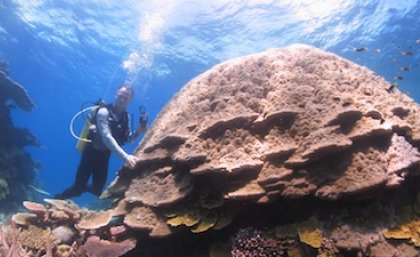
STUART Kininmonth’s life on a north Queensland tropical island is a world away from his childhood on a farm in Gippsland, Victoria.
Surrounded by the Great Barrier Reef and bathed in almost year-round sunshine, every day he looks at aqua water, white beaches and sea creatures of every shape and colour.
Mr Kininmonth is not on a life-long holiday — but he says it sometimes feels that way.
He is at the forefront of his career in ecology, working as a research scientist with the Australian Institute of Marine Science.
“I have a dream job in tropical Queensland,” he says.
After completing a Bachelor of Science degree at The University of Melbourne, Mr Kininmonth’s career drew him north.
His latest achievement: a Doctor of Philosophy (PhD) from The University of Queensland that is due to be awarded later this year.
“I had worked at a number of organisations as a program manager and geographical information system manager, completed a Masters of Resource Science and then gained a job with AIMS in 2001,” he said.
“At AIMS I realised I needed a PhD to proceed further along the science road. I was particularly interested in the field of networks and ecology and saw that further study would both allow me to explore the topic and progress my career in that direction.”
Mr Kininmonth began his PhD as a part-time student in 2002 at UQ on the topic Connectivity Modelling of the Coral Reef Ecosystem.
He said he chose UQ because its School of Biological Sciences was renowned for mathematical modelling of ecology for conservation.
“I also wanted the opportunity to work with Professor Hugh Possingham who is a world leader in this field,” he said.
“During my degree I was fortunate enough to participate in several think-tank trips to Heron Island and Orpheus Island where working groups would discuss and develop ideas in conservation planning and ecology.”
His life in Queensland is vastly different from the one he had in Victoria, but Dr Kininmonth has welcomed the transition.
"Back in Gippsland I learnt to scuba dive in a river that was muddy and freezing,” Mr Kininmonth said.
“Now in north Queensland where the waters are warm, I complain when the visibility is less than 20 metres on the reef!"
He said his current position at AIMS allowed him to investigate the role of networks in marine ecology.
“I hope to influence decision makers, to make them aware that the natural systems they manage interact in special ways and this character needs to be understood when applying conservation measures,” he said.
Mr Kininmonth did a double major in zoology and environmental genetics for his bachelor’s degree, followed by a Diploma of Education in the late 1980s.
It was after that, in his early 20s, that he moved north.
The University of Queensland is holding a public lecture and information evening on Wednesday 23 March at the Sofitel Melbourne on Collins from 4:30pm.
At the event, the UQ Graduate School will launch new initiatives and scholarships specifically for interstate students.
For more information visit www.science.uq.edu.au/researchroadshow or contact uqadvantage@gradschool.uq.edu.au, phone 07 3346 0508 or phone Dr Jessica Gallagher on 0435 961 173.
Media: Carly Dengate (07 3346 0509, c.dengate@uq.edu.au), Stuart Kininmonth (0439 673 546).
Notes to the editor: The Federal Government’s 2010 Excellence in Research for Australia survey confirmed The University of Queensland as one of the nation’s top two universities, measured on a combination of research quality and breadth. ERA reported that research at UQ is above world standard in more broad fields than at any other Australian university: this reflects UQ’s leading global role in many areas of discovery.
UQ’s outstanding critical mass offers researchers significant interdisciplinary capability.
UQ was established in 1911, opening its doors to 83 students (including 23 women). Since becoming the first university in the State, UQ has produced more than 180,000 graduates and currently has more than 43,700 students across four main campuses in south-east Queensland: St Lucia, Ipswich, Gatton and Herston.
UQ is consistently ranked among the top one per cent of universities in the world:
• 43rd – QS World University Rankings, 2010
• 81st – Times Higher Education World University Rankings, 2010-2011 (the only Queensland university and one of only five Australian universities in the top 100)
• 11th (Asia-Pacific) and 108th (World) – Shanghai Jiao Tong Academic Ranking of World Universities
UQ is a founding member of the national Group of Eight (Go8) – a coalition of leading Australian universities, intensive in research and comprehensive in general and professional education. Collectively, the Go8 account for 70 percent of all research in Australia’s university system and generate 80 percent of spin-off companies created by Australian universities.
UQ’s has some of the world’s leading academics and researchers and is home to more than 2000 experts with global partnerships. With research income in excess of AUD$303 million and operating more than 2330 research projects with collaborators in over 50 countries and operating more than 130 research centres, UQ is one of the most prestigious research institutions.
About the UQ Graduate School: A Doctor of Philosophy (PhD) is one of the highest degrees that can be awarded. It is an advanced academic qualification seen as a requirement for the majority of academic and research positions. PhD students conduct a research project, generally over a three to four-year period, which involves formulation and identification of a significant problem, development of conceptual and methodological skills, and contribution of new knowledge.
A Master of Philosophy (MPhil) is also a postgraduate research degree involving a significant project which requires students to develop and enhance analytical and research skills through independent investigation. Usually conducted between 15 and 18 months, students develop specialist knowledge. A PhD or MPhil can be completed in any field; from arts to social science, to nanotechnology or sustainable development.
Research higher degrees allow greater opportunity and choice, enable the pursuit of altruistic endeavours, enhance career focus, and create the next generation of innovators.
Approximately 4000 students are undertaking a research degree at UQ are supported by the UQ Graduate School which focuses on enriching the quality of academic life; providing high standards of supervision, and assisting RHD students throughout their degree and in career opportunities in academia, industry, or government.
The Graduate School coordinates year-long Skills Training programs, Graduate Student Week events, an annual Three Minute Thesis (3MT™) competition, and research commercialisation training.
UQ has supported more than 13,000 students to complete research degrees.




